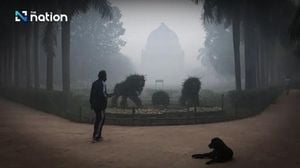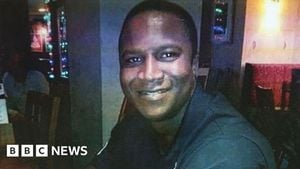James Carville, the veteran Democratic strategist known for his role in helping to elect Bill Clinton, is sounding the alarm about the upcoming presidential election. Sitting down with MSNBC’s Ari Melber, Carville expressed his deep fears about the challenges Vice President Kamala Harris faces as she gears up for the election on November 5. With time running out and looming distractions, particularly Hurricane Milton, he’s feeling particularly anxious. "The only thing I feel is, the election’s coming on Nov. 5. I’m scared to death,” Carville admitted, shocking viewers with his emotional candor.
While he’s previously suggested Harris could besiege the Oval Office, he’s sounding the caution bell now, stating she has limited time to communicate effectively with voters. "Not in a particularly reflective mood right now," he said. "I’m very, very concerned and very scared." With fewer than 20 days left to reach voters, according to Carville, the urgency is palpable, particularly as hurricane news could monopolize media coverage and distract from her campaign efforts.
Harris has so far embarked on a media blitz, trying to exploit every opportunity to connect with the public. This involves appearances on shows like ’60 Minutes’ and late-night talk shows. Yet Carville insists these efforts, where she finds herself responding to questions rather than setting the agenda, are insufficient. “They need to be sharp,” he advised. “They need to be aggressive. They need to stop answering questions and start asking questions.”
He stressed the importance of stepping up her strategy to actively challenge opponents rather than remaining reactive. “If I have to do press, I get to ask the questions. If they do press conferences, let’s make sure they are controlling the narrative,” he explained.
Former President Barack Obama could prove beneficial to this agenda, Carville suggested, advocating for Harris to utilize high-profile allies to tackle key issues rather than relying solely on herself. He drew comparisons to how Obama could effectively engage the party’s base. “I would put President Obama out to make those key points,” Carville said, referring to Obama’s current popularity among Democrats.
While polling suggests Harris holds a slight advantage over her GOP opponent, Carville isn’t convinced it’s enough. He believes the Democrats aren’t doing enough, pointing to what he sees as increasingly common inaccuracies propagated by the Trump campaign. Carville remarked, "But we’re just letting it go," illustrating the perilous nature of misinformation swirling around the election.
He likened the situation to having an infected wisdom tooth removed, describing the relief people feel when they finally rid themselves of something harmful but emphasizing the need for those who remain motivated. “People wanted change,” he reiterated. "72% wanted something different. There’s both relief and the realization things need to shift.”
Time is of the essence as early voting has already commenced across many states. His worries only deepened with the arrival of Hurricane Milton, noting how it could effectively erase several days of campaigning. “You’re probably under 20 days to really get messages out,” Carville warned, underscoring the urgency.
The strategist also expressed disappointment over Harris’ passive communication strategies, urging her to launch targeted agendas aimed at unraveling the fabrications surrounding the Trump-Vance ticket’s claims. “It’s not the time to be passive,” he urged. “They should be much more aggressive.”
This isn’t just about winning; for Carville, it’s also about survival. “You want to see her do more, create more environments for effectively addressing problems,” he added. His comments serve as cautionary guidance not just for Harris but for Democrats with eyes on the election.
The countdown to the November election is well under way, and for Carville, each ticking second imposes greater pressure—a pressure which he believes must translate to bold, unyielding action if Democrats hope to sway voters and reclaim confidence.



